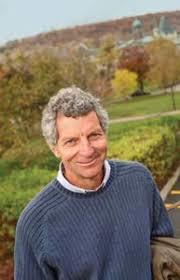

|
|
Ph.D. 1978, Applied Biology, Cambridge University
M.Sc. 1975, Botany and Microbiology, University of London
Dipl. in Conservation 1975, Geography/Botany/Zoology, University of London
Bach. Environmental Studies (Honours) 1974, Geography, University of Waterloo
Professional field : environmental management
Languages: English, French, Spanish
Geographic study area : Canada, Africa, Latin America
Present Position
- Associate Professor, McGill University, Department of Geography
- Additional associations
- McGill School of Environment
- Quebec Centre for Biodiversity Science
- African Field Study Semester
- Human Ecology Review – Editorial Board
Research Interests
- Community-based management of environmental and ecological resources
- Adaptation and innovation in indigenous and traditional land-use systems
- Biodiversity conservation management
- Environmental impact assessment ‑‑ public participation and community values
- Safe and effective experiential environmental field programs learning opportunities
- Current Projects:
- Biodiversity conservation and community development in Laikipia, Kenya.
- Biodiversity conservation and links to resource-based livelihoods in the Galapagos Islands, Ecuador.
- Community involvement in environmental planning in Kibera, Kenya.
Recent Positions Related to Research
- Founding Director -- Canadian Field Studies in Africa; African Field Study Semester (2002-2012) -- Instructor (2012-present).
- Instructor and Planning Committee -- Panama Field Study Semester, McGill (2006-2020)
- Student Mentor -- MasterCard Foundation Scholars Program, McGill (2014-2019)
- Principal Investigator -- McGill Project on Community Based Environmental Decision Support (CBED) (1996-2008)
- Past President -- Society for Human Ecology (2000-2001)
- Charter Member -- Canadian Consortium for Sustainable Development Research
- Chair, African Studies, McGill University (2007 – 2009)
- Board Member -- Morgan Arboretum. (1998 – 2006)
- Past Board Member, Association québécoise pour l'é valuation d'impacts. (2002 – 2004)
- Co-founder, member of trilateral (three country, six university), North American Consortium for Community-Based Biodiversity Conservation. (1996 – 2000)
- Founding Director – McGill Environmental Studies Program. (1981-1998)
Previous Positions Related to Research
- Board Member, Association québécoise pour l'évaluation d'impacts
- Co-founder, member of trilateral (three country, six university) , North American Consortium for Community-Based Biodiversity Conservation.
- Board Member, Fondation du Maire de Montreal pour la Jeunesse.
- Visiting Researcher, Universidad Nacional Autonoma de Mexico.
- Coordinator, McGill Project on Sustainability and Development.
- Executive member, Canadian Association of Geographers.
- Convener of Panel on Critical Environmental Zones Canadian Global Change Program (Royal Society of Canada).
- Member, International Geographic Union, Commission on Critical Zones.
- Founder, past director, present member, Canadian Association of Geographers Impact Assessment Study group.
- Chair, organizing committee, Society for Human Ecology Conference, Montreal.
- Consultant on impact assessment. UNEP, Nairobi.
- Visiting Lecturer, University of Nairobi.
- Chairman, Organizing Committee for the Second North American Caribou Workshop
- Member, Canadian Society of Environmental Biologists' Committee for Environmental Impact Assessment.
- Consultant on land use change and development around Kootenay National Park, B.C.
Recent Publications
(Since 2010 -- full list available on request.) (Refereed except *)
Meredith, T., Blair, A., Burbano, D. (2021). Vulnerabilities in the Conservation–Tourism Alliance: The Impacts of COVID-19 in Laikipia and the Galapagos Islands. Human Ecology Review, 26(1)
Meredith, T., MacDonald, M., Kwach, H., Waikuru, E., & Alabaster, G. (2020). Partnerships for Successes in Slum Upgrading: Local Governance and Social Change in Kibera, Nairobi. In Land Issues for Urban Governance in Sub-Saharan Africa (pp. 237-255). Springer, Cham.
Burbano, D. V., & Meredith, T. C. (2020). Effects of tourism growth in a UNESCO World Heritage Site: resource-based livelihood diversification in the Galapagos Islands, Ecuador. Journal of Sustainable Tourism, 1-20.
Burbano, D. V., & Meredith, T. C. (2020). Conservation strategies through the lens of small-scale fishers in the Galapagos Islands, Ecuador: Perceptions underlying local resistance to marine planning. Society & Natural Resources, 33(10), 1194-1212.
Burbano, D. V., Meredith, T. C., & Mulrennan, M. E. (2020). Exclusionary decision-making processes in marine governance: The rezoning plan for the protected areas of the ‘iconic’Galapagos Islands, Ecuador. Ocean & Coastal Management, 185, 105066.
Meredith, T., and MacDonald, M. (2017). Community-supported slum-upgrading: Innovations from Kibera, Nairobi, Kenya. Habitat International, 60, 1-9.
Blair, A. G., and Meredith, T. C. (2017). Community perception of the real impacts of human–wildlife conflict in Laikipia, Kenya: capturing the relative significance of high-frequency, low-severity events. Oryx, 1-11.
Ford, J., Maillet, M., Pouliot, V., Meredith, T., Cavanaugh, A., & IHACC Research Team. (2016). Adaptation and Indigenous peoples in the United Nations Framework Convention on Climate Change. Climatic Change, 139(3-4), 429-443.
Meredith, Thomas and Melanie MacDonald. (2014). Kibera Integrated Water Sanitation and Waste Management Project: Progress and Promise: Innovations in Slum Upgrading. United Nations Human Settlements Programme. UNON, Publishing Services Section, Nairobi. 120 pp. (and on line at http://unhabitat.org/books/kibera-integrated-water-sanitation-and-waste-management-project/ )
Meredith, Thomas. (2011). Review for Canadian Geographer “Environmental Impact Assessment: Practice and Participation” Edited by Kevin S. Hanna, Oxford University Press, Don Mills, Ontario, 2009, xii + 467 p *
Meredith, Thomas. (2011). Review for Canadian Geographer: “The Challenge for Africa: A New Vision By Wangari Maathai, William Heinemann, London, 2009, 319 p. paper (ISBN 9780434019816).*
Klinsky, Sonja, Renee Seiber, Thom Meredith (2010). Connecting Local to Global: Geographic Information Systems and Ecological Footprints as Tools for Sustainability. Professional Geographer, Vol 62 (1): 84-102. ( http://dx.doi.org/10.1080/00330120903404892)

